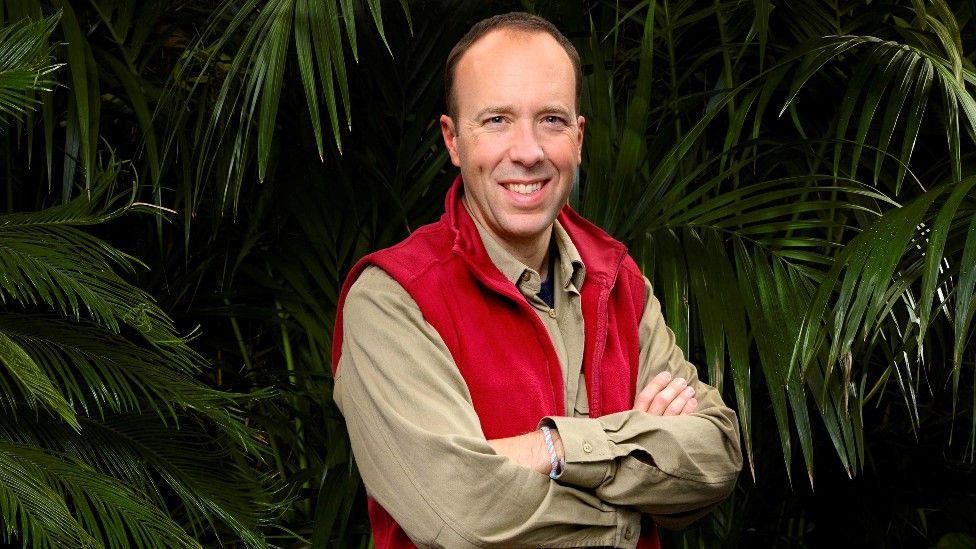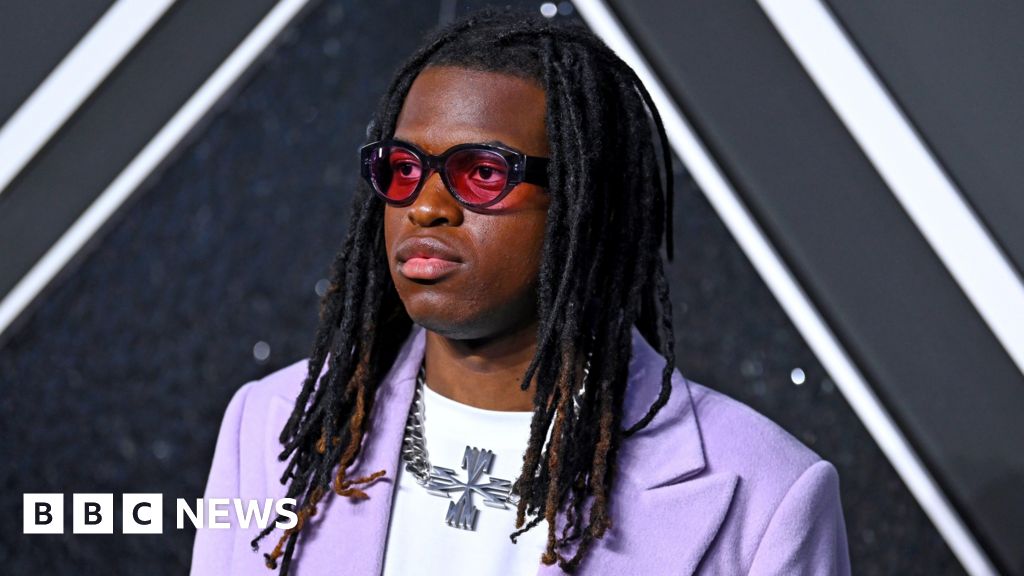ARTICLE AD BOX
 Image source, ITV
Image source, ITV
Matt Hancock was eliminated from I'm A Celebrity despite taking on a series of tough trials
By Katie Razzall
Culture editor
Former Health Secretary Matt Hancock came third in the jungle final, having made it there against the odds.
His appearance on I'm a Celebrity… Get Me Out Of Here! had caused public outcry.
The MP defended his decision to leave his constituents behind, saying he wanted to raise awareness of dyslexia and show that politicians are human beings.
But has reality TV proved a path to redemption or a PR stunt?
'A bit of forgiveness'
Early on in his time in the jungle, Hancock told the other contestants he was looking for "a bit of forgiveness".
A Place in the Sun's Scarlette Douglas said it brought tears to her eyes.
But what about the rest of us, watching at home?
Image source, ITV/Shutterstock
Image caption,Matt Hancock appearing to do some soul-searching with Scarlette Douglas
For many in his constituency and wider, the sight of Hancock (with his reported £400,000 fee) gadding around Down Under so soon after his actions during the pandemic plainly stuck in the craw.
Let's not forget, less than 18 months ago, Hancock was caught on camera in an excruciating clinch with his aide, now partner, Gina Coladangelo. He'd broken the social distancing rules he'd helped create (and told the rest of us we must follow).
Image source, PA Media
Image caption,As then Health Secretary, Matt Hancock urged people to stick to 2m social distancing rules during the pandemic
Image source, Getty Images
Image caption,Matt Hancock admitted breaking those rules after pictures of him kissing an aide, Gina Coladangelo, were published in a newspaper
As health secretary, he even more damagingly presided over a hospital discharge policy at the start of the pandemic that saw elderly patients, some of whom it turned out had Covid, moved into care homes. It allowed the disease to spread rapidly. Many thousands of people in those homes died in the first stages of the pandemic.
Many argue that there's a lot to atone for. Was reality TV the way to do it?
Modern day stocks
The medieval shaming of being pelted with rotten vegetables in the stocks has been replaced by daunting trials of sufferance inflicted by exotic animals, living and dead - Hancock wasstung by a scorpion and ateboth a camel penis and a sheep vagina.
This type of TV can be a vehicle for humiliation. The producers know it, the public loves it. It's presumably why Hancock did six consecutive Bushtucker trials at the start - five of which were the result of a public vote.
Image source, ITV/Shutterstock
Image caption,Hancock (pictured with Boy George) ate a camel's penis, a sheep's vagina and a cow's anus during a Bushtucker trial
But Hancock wasn't humiliated. If people wanted to see him fail, he didn't. Instead he was good at the trials. That may be why the public started choosing other celebrities to do them instead. Hancock the hero wasn't what they were after.
Or did they begin to warm to this politician who seemed, frankly, capable?
Some newspapers have reported a behind the scenes PR campaign to garner votes for Hancock. But peoplemay have genuinely felt some sympathy for him after the spiky reception he received from some of his fellow celebrities when he arrived.
As the former Culture Secretary Nadine Dorries, who has also been on the show, pointed out, Hancock outlasted contestants she said had been "unpleasant, mean and gossipy" about him.
One of those she named, Chris Moyles, when he was eliminated on Thursday joked: "I'm gutted Matt Hancock is more popular than me. What is going on?"
Image source, ITV/Shutterstock
Image caption,Hancock was seen hugging his fellow campmate Charlene White, who had been critical of his actions
Just over a year ago, the UK's early response to the pandemic, when Hancock was health secretary, was judged "one of the UK's worst ever public health failures", by two Parliamentary committees.
Perhaps the public, or at least those watching I'm a Celebrity, happily distinguish individuals from wider collective political decisions.
The programme's voting system may also have kept Hancock in the show far longer than many expected. If viewers had been voting to oust rather than voting to keep, he might not have lasted as long as he did.
Or, as David Yelland, the former Sun editor who now has years of experience running a communications company, told me, it may be that keeping Hancock there just made "good TV".
Despite his success, getting to the programme final, Yelland believes Hancock's reputation has actually gone down amongst the wider public while he has been in the jungle. People "have a lower opinion of him than when he started this strategy".
Stunt or genuine contrition?
Whether Hancock is genuine or a master of PR is key to whether he can truly earn the forgiveness he said he sought.
He's not the first politician to try to reinvent himself through reality TV. Who can forget George Galloway crawling around pretending to be a cat on Celebrity Big Brother? The former Labour and Respect MP purring and lapping up cream is an image that can never be unseen.
Ditto Ed Balls' Gangnam Style on Strictly, although in his case, moving from Westminster to waltzing actually worked and Balls is now a respected media presenter.
Ex-shadow chancellor Ed Balls performing the Salsa with Katya Jones during a Strictly Come Dancing dress rehearsal
Neither, though, had sunk to the levels of public opprobrium that Hancock has.
Sir Craig Oliver worked with Matt Hancock and says he wishes him well.
"He has fallen very far, very fast," the former director of communications for David Cameron told me.
But by entering the jungle, "he took a huge gamble," Sir Craig says. "Lots of people including me would have said 'don't do it'. People were expecting such a terrible pasting for him. What he has done is show his 'can do, don't let anything knock you down, thick skin positive attitude'. He will see it as job done."
Sir Craig Oliver was David Cameron's director of communications
However Sir Craig believes "the jury is very much out" on whether it's enough to create a new career as a media personality.
Yelland says "there may be ways he can make money but that's not really the point. I think he has to apologise for what happened on his watch, serve his constituents and seek to restore his reputation first".
Seeking forgiveness
When a politician transgresses, it's very public. The former MP and Conservative Cabinet minister, Jonathan Aitken went to jail in 1999 for perjury and perverting the course of justice.
He has since been ordained a priest and is now a prison chaplain.
I asked him whether Hancock will be forgiven. He told me forgiveness and redemption, according to Christian teaching, "are not something we can earn, except by being genuinely humble, genuinely penitent and totally sincere in our wish to be forgiven".
Aitken revealed that after he left prison, Celebrity Big Brother came calling. "I turned it down," he said. "I thought it would be a circus and not a real way of moving along the road of forgiveness."
Image source, PA Media
Image caption,Jonathan Aitken outside St Paul's Cathedral in London after being ordained as a Chaplin in 2018
But the former Conservative MP doesn't view Hancock's decision to take part in I'm a Celebrity cynically.
"I think he is signalling that he knows he has done something of some enormity, to all the people who trusted him in politics, to his wife," Aitken says.
"He may even have succumbed to the temptation to over-atone. He's fallen publicly and he thinks he has to atone in public."
Can Hancock be forgiven?
In the end, Hancock lasted far longer than the predictions.
He said he wanted to offer a politician's human side and, in that sense, he has. We know, for example, he likes Ed Sheeran, has "cooked over a firepit all my life" and, age 14, feared his family were going to lose everything "when the business nearly went bust".
Despite his three weeks on the programme, there are still many who will never forgive him. Not least the Covid-19 Bereaved Families for Justice who flew a banner over the camp.
Image source, PA Media
Image caption,Covid-19 Bereaved Families for Justice flew this banner over the jungle with this message for Matt Hancock
However well he has done, the backlash is surely worse. Searches of his name bring up a torrent of abuse, mocking videos and downright fury at his behaviour.
The reality TV audience may have warmed to him, aided perhaps by slick Tiktok videos urging people to #VoteMatt. But that apparent popularityis by no means representative of the entire population.
Sir Craig told me: "You can never say never in politics, but it's very hard to see him coming back to the frontline."
Even if his career in top flight politics is over,that doesn't mean we won't be hearing a lot more from Hancock, certainly in the short term.
His book, Pandemic Diaries, will be published in December, and there'll be another reality TV appearance, in Channel 4's Celebrity SAS: Who Dares Wins.
And if all this positioning does bring about a long-lasting and lucrative media career, who's next? Liz Truss in next year's I'm A Celebrity, anyone?

 1 year ago
20
1 year ago
20








 English (US)
English (US)